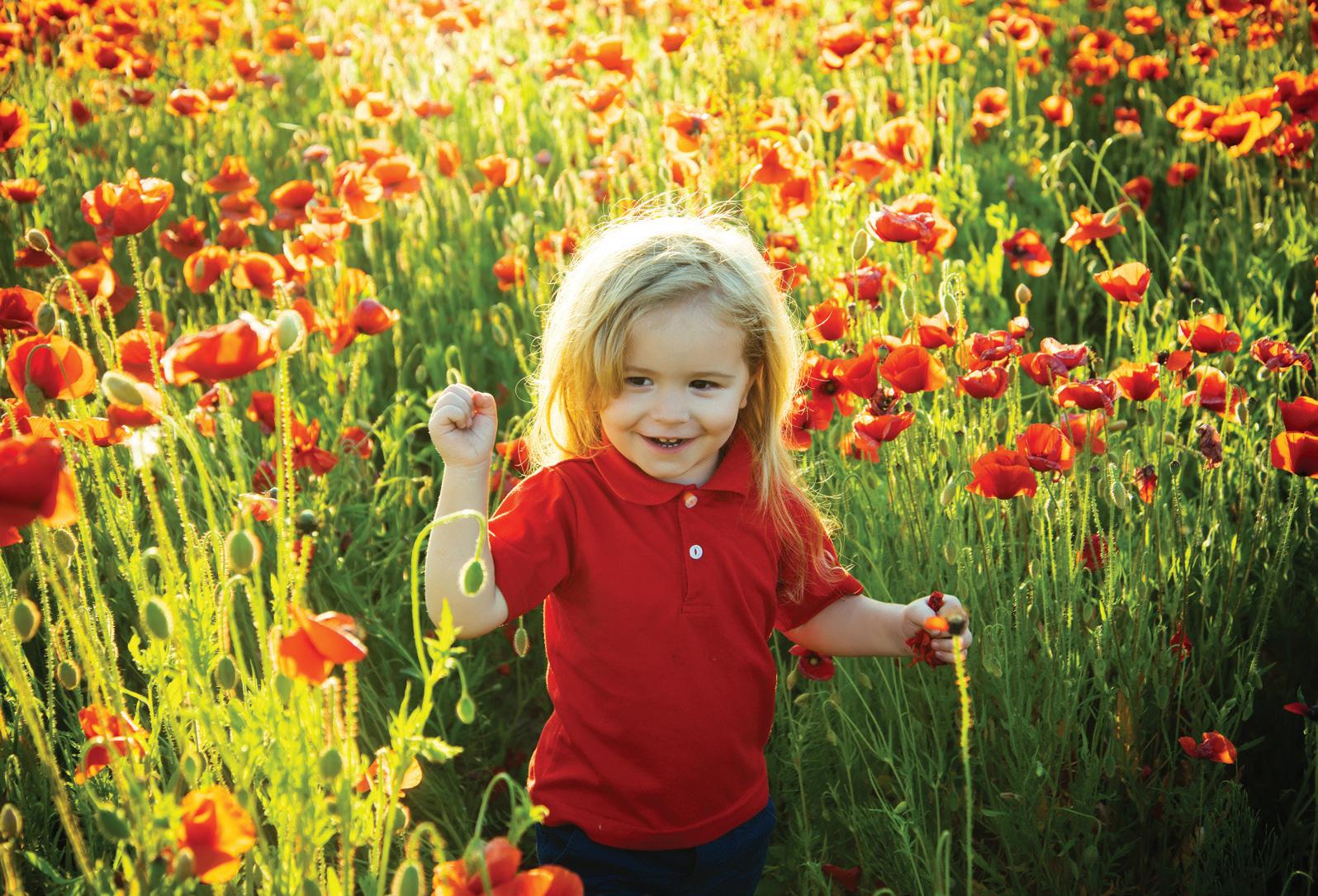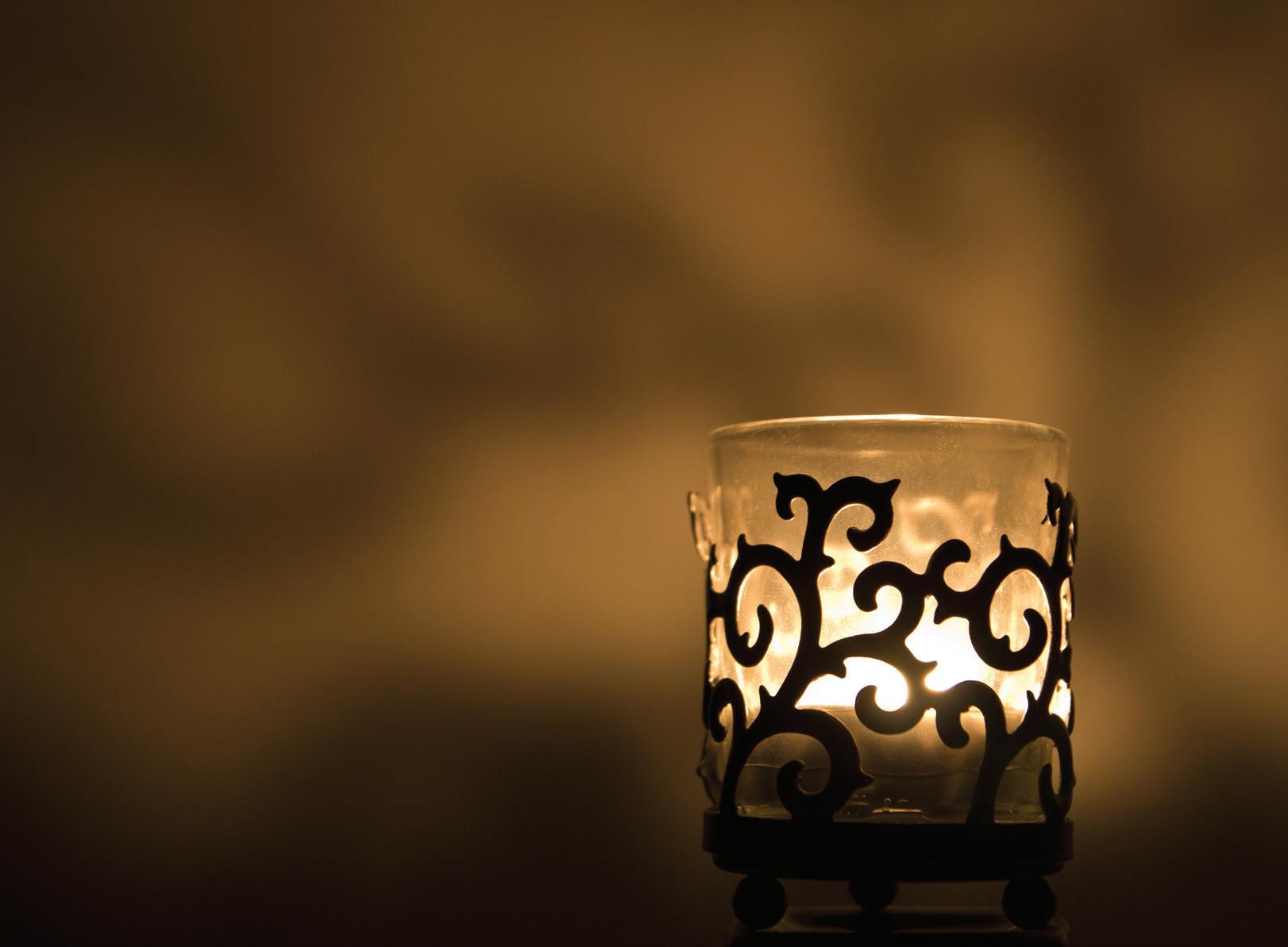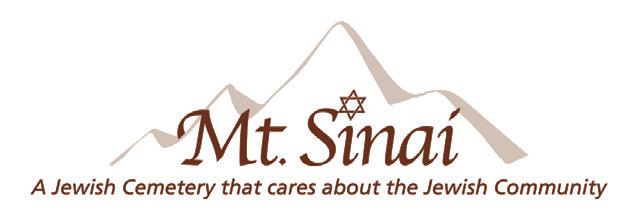
9 minute read
LIFECYCLE
Birth/Infancy
The first significant ritual for a Jewish child is the naming. Jewish children are given Hebrew names in addition to their English names.
A boy receives his Hebrew name at the brit milah (bris), the circumcision of the male child, performed on the eighth day after birth. The circumcision is performed by a highly trained person called a mohel or, if a mohel is unavailable, by a Jewish doctor under the supervision of a rabbi.
The baby girl is named at a simchat bat, with no strict traditions that allow parents to create their own ceremony for welcoming their daughter into the Jewish community.
A series of rituals guide Jewish families and individuals through each stage of life.

Except for the rituals surrounding death, each of the following stages is often accompanied by festive celebrations. Even the rituals surrounding death bring the community together to remember and honor the deceased and support their family. The following guide is adapted from stories in our archives.

Bar/Bat Mitzvah
The formal rite of passage into adulthood for Jewish boys and girls is celebrated when they become a bar or bat mitzvah (son/daughter of the commandment).
For both boys and girls, reaching the age of bar/ bat mitzvah means they are considered “adults” according to Jewish law, and are responsible for their own actions regarding Jewish ritual, religious laws, traditions and ethics.
A boy becomes a bar mitzvah on his 13th birthday; a girl is considered a bat mitzvah, in Orthodox and Conservative Judaism, when she reaches the age of 12; in Reform Judaism, at the age of 13. Upsherin
For many boys, their first haircut is at three years of age. This ceremony is called an upsherin – a Yiddish word meaning to “cut off.”
The third birthday is a significant stage in the life of a Jewish boy. It is then that he officially begins his Torah education, and starts to wear a kippah and tzitzit.

Marriage
A Jewish wedding is a powerful Jewish ritual that serves as a reminder of the power of love and union.
There are a few stages to a traditional Jewish wedding: erusin/also called kiddushin (betrothal on the wedding day), ketubah (statement of obligations), chuppah (the wedding canopy), nesuin (marrying with a ring and witnesses), yichud (marital seclusion, an Ashkenazic custom in which the bride and groom spend 10 to 20 minutes in a private room) and sheva brachot (the seven blessings and celebrations).
The breaking of the glass at the conclusion of the ceremony has been interpreted by many to symbolize the destruction of the Temple in Jerusalem. The glass reminds us that even during the most joyous of occasions, we still mourn. Others consider the glass’s

fragility as a symbol of the frailty of human relationships, or that the couple is breaking with their past lives so that they can create a new family together.

Death and Mourning
When a Jewish person dies, there are clear directions as to how things should proceed with regard to the body, the burial, the funeral and mourning.
The concept of honoring the dead is reflected in all Jewish burial customs. Burial takes place as soon as possible, sometimes within 24 hours after death, or as shortly thereafter as relatives can gather for the service.
There is a mitzvah to join a burial society (chevra kadisha), which ritually prepares the body for burial, and to sit with the body (as a “shomer,” or guard, between the time of death and the burial).
While always tragic, the Jewish rituals around death, funerals and mourning recognize that grieving and recovery after the death of a loved one is a long and gradual process.
The process begins with shiva – seven most intense days of mourning; then shloshim – first 30 days of mourning; and aveilut – year of mourning. While one is an avel (mourner) for a full year for immediate relatives, one only says kaddish for the first 11 months of the year. The unveiling consists of removing a veil to reveal the tombstone in a relatively short ceremony marking the gravestone’s dedication.
Yahrzeit is the anniversary of the day of death, often observed by saying kaddish, giving charity (tzedakah) in memory of the deceased, and visiting the grave. It is considered a mitzvah is to mark a grave with a stone. Each mourner adds a stone to the collection on the grave.
Judaism reminds us that there is permanence amidst the pain. While other things fade, stones and souls endure.
Jewish life revolves around the cycle of life.
In the Jewish tradition, lifecycle moments from birth to death carry specific rituals, most of which have been used for centuries. These moments truly center us.
Following are the resources that will help you celebrate and mark each stage of life.
SIMCHA VENUES
ARIZONA JEWISH HISTORICAL SOCIETY
Cutler-Plotkin Jewish Heritage Center Dr. Lawrence Bell, Ph.D., Executive Director Jeffrey Schesnol, Associate Executive Director, MAJS, Ordained Madrikh & Rabbinic Candidate Stacy Faherty, Events Manager 122 E. Culver St., Phoenix 602-241-7870 azjhs.org sfaherty@azjhs.org Beautifully restored historic venue, Phoenix’s first synagogue, is available for weddings, b’nai mitzvah and other celebrations for up to 250 people and annual Heritage Award Gala. Contact Stacy. Open to people of all faiths. Original hardwood floors and 10-foot arched windows, plus museum gallery and lovely outdoor garden and terrace.

INA LEVINE JEWISH COMMUNITY CAMPUS
12701 N. Scottsdale Road, Scottsdale 480-481-7123 iljcc.org
JEWISH HISTORY MUSEUM
Gugulethu Moyo, Director of Operations 564 S. Stone Ave., Tucson 520-670-9073 jewishhistorymuseum.org operations@jewishhistorymuseum.org Indoor space in the historic synagogue building is available for rent for meetings, simchas and other occasions for up to 100 people. Multiple outdoor spaces are also available for events for up to 250 people. Tours of the museum and Holocaust History Center may be included.
MINKOFF CENTER FOR JEWISH GENETICS
Wendy Carriere, Executive Director Carol Abrams, Board President 12701 N. Scottsdale Road #201N, Scottsdale 480-668-3347 JewishGeneticsAZ.org info@jewishgeneticsphx.org We provide prenatal genetic screening for those of childbearing age (18-45). Screening results for couples help to identify genetic risks and may provide options available to them so that they go on to have healthy children. We also provide screening and referral services regarding hereditary cancers, specifically the BRCA 1 and BRCA 2 founder gene mutations associated with inherited breast and ovarian cancers found in the Jewish community. Men and women age 25 and over are welcome to register.
MOHELS
A mohel is the person who performs the circumcision in the brit milah ceremony for a male child on the eighth day after his birth. For more information, contact your local congregation.
RICHARD DOBRUSIN, DO
1124 E. McKellips Road #110, Mesa 480-882-7370
KEITH DVEIRIN, MD
7340 E. Speedway #104, Tucson 520-547-7045
AVRAHAM GAVRIELOV
A to Z Circumcision Services of Phoenix 520-390-4590 myazmohel.com
STEVEN HAUBEN, MD
3301 N. Miller Road #170, Scottsdale 480-661-4131
RABBI MENDY LIPSKIER
Statewide 480-776-4763 azbris.com
ROBERT S. LIPSON, MD
602-264-0608 affiliatedurologists.com
RABBI YOSSIE SEMEL
Phoenix 602-326-3885 azmohel.com
MIKVAHS (MIKVAOT)
A mikvah is a ritual bath satisfying specific requirements that incorporate “living water” (running or moving water from a Godgiven source such as rain, snow, ice or a spring). Immersion in a mikvah is performed for ritual purification and a change in status, including conversion. It is used by Jews who wish to observe the Jewish laws concerning family purity or sanctification before a Jewish holiday, wedding or conversion ceremony. The purpose of immersion is not physical, but spiritual, cleanliness. Today, mikvah use has taken on some modern spiritually satisfying meanings. Immersion is often a way of celebrating both happy milestones and the pains of overcoming losses.
CHABAD MIKVAH OF TUCSON
2443 E. Fourth St., Tucson 520-975-0137, 520-869-4971 chabadtucson.com
THE FLAGSTAFF MIKVAH
Chabad of Flagstaff 930 W. University Ave., Flagstaff
GOLDMAN MIKVAH
Congregation Beth Tefillah 6529 E. Shea Blvd., Scottsdale 480-580-5685 bethtefillahaz.org/goldman-mikvah
MIKVAH CHAYA MUSHKA
Chabad of Phoenix 2110 E. Lincoln Dr., Phoenix 602-509-7430 chabadaz.com
PERACH YISROEL COMMUNITY MIKVEH
(also offers a keilim mikvah, located in the courtyard) Congregation Chofetz Chayim 5150 E. Fifth St., Tucson 520-747-7780 tucsontorah.org
PHOENIX KEILIM MIKVAH
(for utensils; located in the back of the building) Phoenix Community Kollel 6516 N. Seventh St., Phoenix 602-433-0300

THE PHOENIX MIKVAH
840 E. Maryland Ave., Phoenix 602-282-0307 phoenixmikvah.org
STEIN FAMILY COMMUNITY MIKVEH
Congregation Beth Israel 10460 N. 56th St., Scottsdale 480-951-0323 ext. 141 cbiaz.org/mikveh
CHEVRA KADISHA/ JEWISH BURIAL SOCIETIES
Chevra kadisha, literally holy society, performs the traditional ritual of preparing individuals for burial. Volunteers carry out the ritual of washing, purifying and dressing the deceased, with men caring for men and women caring for women to maintain modesty even in death. Since Judaism promotes the dignity of all with all being treated equally in death, the deceased is dressed in simple shrouds and buried in a plain wooden (usually pine) box.
CHEVRA KADISHA OF NORTHERN ARIZONA
Temple B’rith Shalom 2077 Brohner Way, Prescott 928-708-0018 brithshalom-az.org
CHEVRA KADISHA OF PHOENIX
515 E. Bethany Home Road, Phoenix 602-277-8858
CHOFETZ CHAYIM CHEVRA KADISHA OF TUCSON
5150 E. Fifth St., Tucson 520-591-5292
JEWISH BURIAL SOCIETY OF YOUNG ISRAEL
Chabad Tucson 2443 E. Fourth St., Tucson 520-975-4489 chabadtucson.com
PEACEFUL RETURN
602-469-1606 peacefulreturn.org
PHOENIX WOMENS CHEVRA KADISHA
Operating at Sinai Mortuary 4538 N. 16th St., Phoenix 602-703-9446, 602-248-0030
CEMETERIES & MORTUARIES BETH EL CEMETERY
Greenwood Memory Lawn Mortuary & Cemetery 2300 W. Van Buren St., Phoenix 602-944-3359 bethelphoenix.com
BETH ISRAEL MEMORIAL CEMETERY
305 S. 35th Ave., Phoenix 480-951-0323 cbiaz.org/cemetery
EAST LAWN PALMS MORTUARY & CEMETERY
5801 E. Grant Road, Tucson 520-885-6741
EVERGREEN MORTUARY & CEMETERY
3015 N. Oracle Road, Tucson 520-257-4831 evergreenmortuary-cemetery.com
GARDEN OF SHALOM AT PHOENIX MEMORIAL PARK
200 W. Beardsley Road, Phoenix 623-434-7000
GREEN ACRES MORTUARY & CEMETERY
401 N. Hayden Road, Scottsdale 480-945-2654
MARANA MORTUARY & CEMETERY
12146 W. Barnett Road, Marana 520-682-9900 maranamortuarycemetery.com
MT. SINAI CEMETERY
Ira Mann, General Manager 24210 N. 68th St., Phoenix (off Pinnacle Peak Road) 480-585-6060 mtsinaicemetery.com info@mtsinaicemetery.com Mt. Sinai is a Jewish cemetery that cares about the Jewish community. The cemetery is Jewish owned and operated, and welcomes both Jewish and intermarried families. Sidewalks in front of every grave provide the utmost respect, and the beautiful outdoor pavilion can be used for funeral services. Our caring and professional staff provides every family with exceptional customer care. Preplanning is available and prices are guaranteed – it’s a gift you give to your family.

PARADISE MEMORIAL GARDENS & MAUSOLEUM
9300 E Shea Blvd., Scottsdale 480-860-2300 messingermortuary.com
SINAI MORTUARY OF ARIZONA
4538 N. 16th St., Phoenix 602-248-0030 sinaimortuary.net






